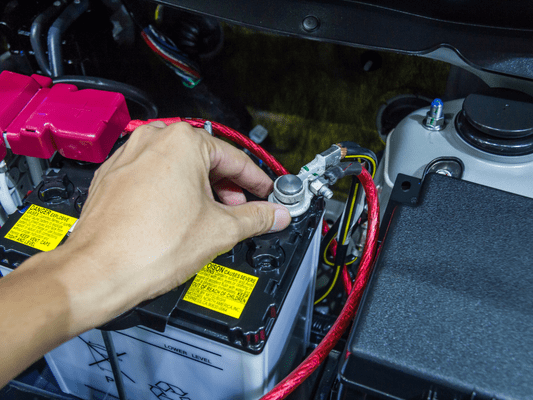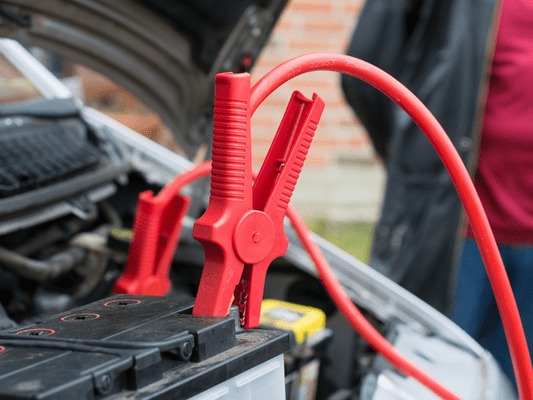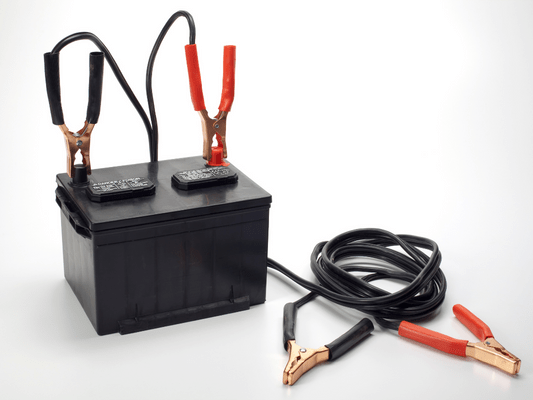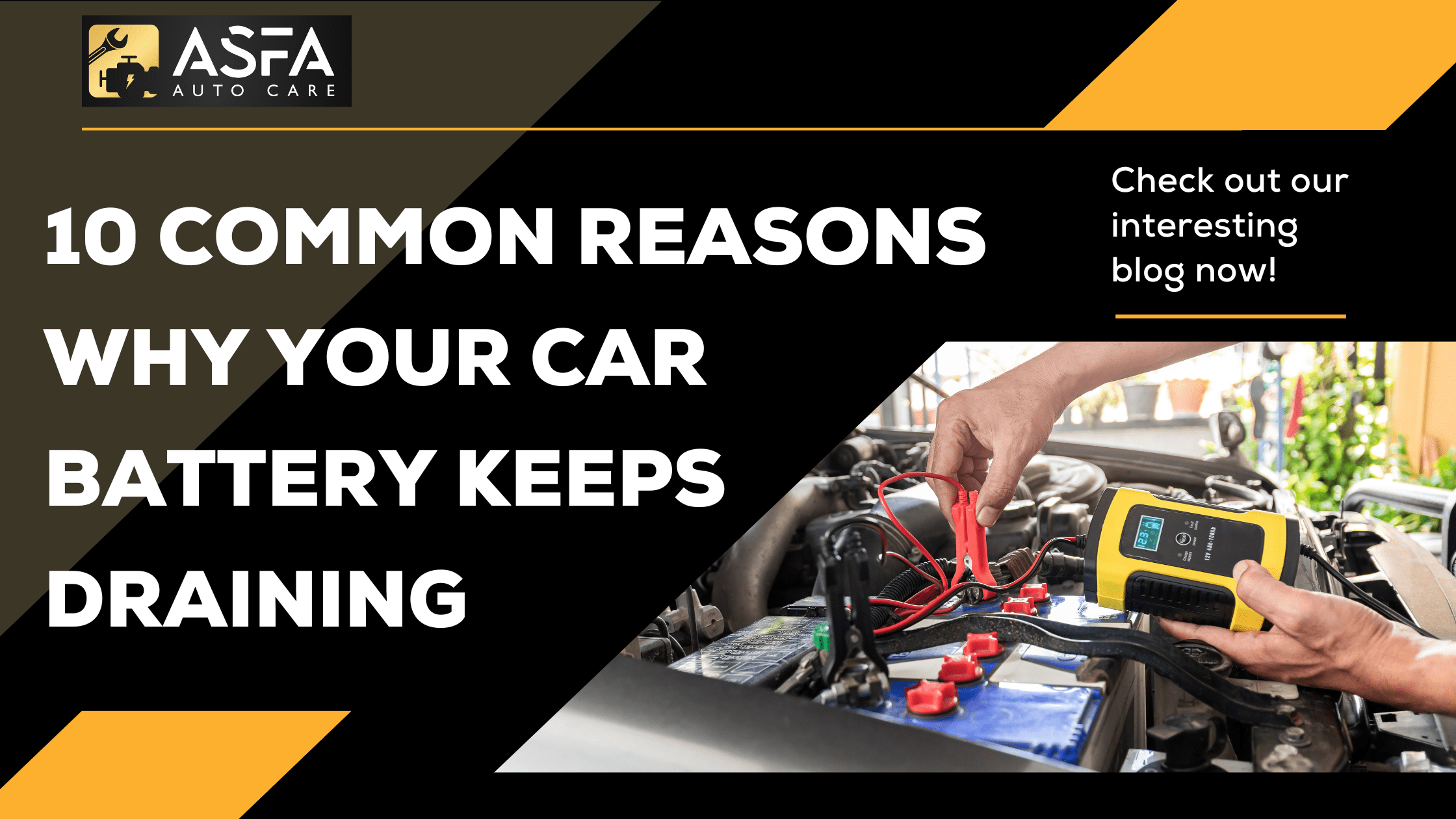You might be aware that mitochondria are the powerhouse of a cell. Similarly, a car’s battery is the electrical powerhouse of the car. The car battery is the heart of the car that powers the electrical components and the vehicle. It converts chemical energy into electrical energy, which helps power the vehicle’s electrical components, such as headlights, radio, heater, etc. So our today’s blog is about the common reasons why your car battery keeps draining.
The car battery also provides voltage to the starter, which cranks the engine and stabilises the voltage to keep the engine running.
A car’s battery is as important as its engine. Imagine you are driving your car in the middle of the night. Suddenly, your headlights dim, and within minutes, the vehicle stops. You might think this is a problem with the engine, but your car battery just got drained.
Car batteries can drain due to many reasons, and there is always a possibility that whatever went wrong the first time around and won’t happen again. But if your car battery continues to drain, there are high chances that an underlying issue needs to be resolved with the assistance of car battery specialist nearby.
In this blog, you’ll understand the major reasons why your car battery keeps draining and how to prevent it from happening.
Why Does A Car Battery Drain?

The battery of a car controls its ignition. Various factors may cause a car battery to drain, and since there are so many potential causes, anything might go wrong. Various symptoms could point to a problem with the battery’s power, such as a weakened alarm system or flickering lights. Therefore, you must ensure that your automobile battery is appropriately maintained and cared for.
The car battery draining can happen due to three major factors:
1. Electrical system problems
2. Battery problems
3. Simple user error
Some of these issues can easily be taken care of by the driver, while others will undoubtedly need a trip to your mechanic. Sometimes you cannot be certain of the issue; in such cases, one must take their car to a nearby auto mechanic to detect and resolve the issue.
If we are to list some of the potential problem-causing elements, they would be:
1. Parasitic Drain
It is a typical occurrence for drivers to leave their headlights on frequently. The battery will start draining if you keep the electrical components, like the air-conditioner, music system, etc., on for longer duration. This can gradually drain the battery’s energy even when the ignition is off.
2. Defective charging system
A defective charging system will cause the battery to discharge quickly as the alternator cannot provide a sufficient voltage that ranges from 13.5 to 14.5 Volts. When the alternator malfunctions, it cannot recharge the battery because of worn-out tensioners, faulty belt connections.
3. Extreme temperatures
Parking your automobile in extremely low or high temperatures that are too cold (below 10 degrees) or too hot (above 38 degrees) can lead to a battery drain. Battery drain is also linked to extreme temperatures. High temperatures can cause lead sulphate crystals to accumulate, which will shorten the battery’s lifespan and increase the time it takes to Recharge.
4. Frequent short rides
Using a bicycle rather than an automobile while travelling small distances is advisable. It is beneficial to both your health and the battery in your automobile. Frequent short rides can cause your battery to drain faster.
Most of the battery’s energy is consumed when the vehicle starts. It takes some time for the battery to restore power. The opposite is true with small drives. It is therefore highly recommended that you avoid taking too many short trips to prevent the battery from depleting faster.
5. Old is not equal to gold
Your automobile battery may no longer be able to recharge itself if it is very old. Recharging it may also be ineffective since it will continue to discharge faster. The lifespan of a typical car battery is about 3 years old. As a result, it is advisable that if the battery has passed the expiration date, it is best to have it replaced rather than recharged.
Top 10 Reasons Why Your Car Battery Keeps Draining

The battery is the spark that lets your car move in the first place, whereas petrol acts as the food that fuels it. Your car might as well be a massive paperweight without that initial shock. Your car’s battery must function correctly for all the other electrical components to function. If your car battery is not working, you won’t be able to start the engine.
So, what exactly happens inside your car to shorten the battery’s life? Let’s now talk about the top 10 reasons why your car battery keeps draining.
1. A defective alternator
The alternator is a generator that distributes electricity throughout the vehicle and recharges the battery. Every time your automobile shifts into another gear, an alternator recharges the battery and gives the accessories a steady supply of electricity. Except for a few hybrid models, any car or truck with a regular internal combustion engine will have an alternator.
You can notice strange noises coming from your automobile, flickering lights, or other problems if the alternator diode starts to fail. The battery loses charge when the alternator breaks out until it can no longer start the automobile. In this case, you will need to jump start your vehicle to give it the necessary power to travel to a repair shop.
2. Old worn-out battery
As a car battery ages, it struggles to maintain a charge and loses its ability to function at its best, just like anything else. A new battery holds its charge longer before an old one does. If your vehicle continuously performs below average and cannot run even with optimum power, then your car’s battery is draining, probably due to an internal factor. Still, it may result from the battery’s numbered days running out and necessitating replacement. Though various outside circumstances influence the lifespan of a battery, you should typically replace the batteries every four to five years.
3. Faulty or corroded battery terminals or loose wires
Cables are connected to the positive and negative terminals of your car battery. For safety reasons, it is customary to disconnect these before performing any maintenance on your car. The battery may discharge if these cables get loose. The wires can be tightened and appropriately reinstalled to fix this issue, but you should always exercise caution when working on a car’s electrical system to prevent shocks or other harm to the automobile.
Get professional assistance if you have any doubts at all. Another potential cause of your battery’s poor performance might be corrosion at the battery terminals. With the above safety precautions in mind and the batteries unplugged, cleaning the terminals with a diluted baking soda solution and a brush, coating them with petroleum jelly, and reattaching the cables can be done, but only if you are certain that you can do it effectively.
4. Parasitic drain
The simple act of draining a car battery even after the motor has been shut off is known as a parasitic drain or parasitic draw. This continuous drain on the automobile battery is due to bad wiring or an electrical issue. Parasitic drain can also signify a bad battery installation or a ruptured fuse in the electrical system.
5. Human error
If the driver doesn’t turn off their car properly, it can result in the vehicle losing its charge quickly. Although some cars require personal effort, most can detect when the lights have been on too long and automatically turn them off or sound a warning beep. For example, your door or trunk may not be completely closed, or you may have left the inside light or the headlights on.
The constant drain could shorten the lifespan of the battery if your car isn’t properly shut off. Hence, it is always advisable to ensure all the lights and doors are turned off and secured correctly before getting out of your car.
6. Frequent short trips
A car’s battery life will be short if the user shuts the engine within a relatively short period, which is insufficient for the car’s battery to recover its lost power. Short-distance commuters frequently experience this battery problem. To fully recharge the car’s battery, one must take a long journey every few weeks.
7. Extreme temperatures
Extreme cold and heat can both lower your battery’s charge capacity. In batteries, extreme heat and cold can lead to the development of sulphate crystals, spreading throughout the system and causing chaos. To lessen the impact of weather, it is advisable to park your car in the shade during summer and to drive far and very frequently in the Winter.
8. Faulty charging system
The charging mechanism harnesses mechanical energy from the moving vehicle to recharge the battery after the battery has been heavily depleted by cranking the engine. The biggest factor affecting the charging rate is worn-out tensioners and belts.
9. Leaking radiator
A head gasket is essential in keeping the engine’s combustion chamber sealed so your car can retain the necessary compression to maintain engine power. Additionally, it prevents coolant or oil from the radiator from seeping somewhere else, reducing the risk of your engine overheating and catching fire.
Now, this head gasket may occasionally blow if there is a leak in the radiator. If this happens, smoke comes out from the engine, and there are banging noises. There will be a power reduction, causing the battery to drain.
10. Local charger
Local or defective chargers carry out the fundamental task of feeding current into the battery without considering the standards, charge levels, etc. These chargers could result in a dead car battery and a subpar charge.
Ways To Prevent Your Car’s Battery From and keep it charged and ready for use

Now you know the reasons why your car battery keeps draining and now let’s checks the ways to prevent a car battery from draining.
If you know of some problems that may be causing some harm to your car’s battery and making it drain faster, follow the following points to keep a tap over the draining battery power:
1. Checking for Loose or Corroded connections
Remember to inspect the cable connections on your car battery and to keep the area around the battery clean so that no grease or dirt may collect there. Follow the below tips:
A. Sandpaper can be used to remove corrosion from cable connectors and battery terminals.
B. Baking soda, water, and a stiff-bristled brush can be used to remove corrosion from batteries.
C. The battery connections must be tight at all times.
D. You should also ensure the connections are tight and corrosion-free and if you can trace the ground and power battery wires to the starter, frame, fuse box, or junction box.
2. Check for interior lights, headlights, and other accessories
Before leaving your car, ensure the interior lights and headlights are off and all accessories, including the USB ports and phone charger socket, are turned off. Make sure to turn off the radio and GPS once the engine is off.
3. Dealing with extreme temperatures
Ideally, you should keep your vehicle in a garage or park in the shade to safeguard the batteries from extreme temperatures. You might also consider buying a battery blanket to keep your car’s fluids from freezing in the winter.
4. Drive frequently
Driving your vehicle frequently will enable the alternator to function properly and prevent the battery from being entirely depleted. Regular driving also lubricates the engine and prevents flat spots by easing pressure on the tires’ bottoms.
5. Maintenance
Everything in an effective car boils down to good maintenance. Maintaining a lead-acid battery, such as the one in your car, in good working condition is essential to extending its lifespan. You can check for the possibility of a battery replacement using these two pieces of equipment:
Hydrometer: This lets you determine each cell’s electrolyte’s specific gravity. After the battery has been fully charged, if one or more cells are extremely low, that is a warning that the battery needs replacement.
Load Tester: With the help of this tool, you can monitor the battery voltage with and without a load applied to it, simulating the draw of a starter motor. Wearing safety equipment is crucial when working near a battery using a load tester.
Conclusion
The battery controls the ignition of your car. An automobile battery primarily contributes to the ignition process by supplying the initial power. From this point on, the car may or may not rely on the battery for more power. But it uses it as a backup source while it is not moving. In any case, the alternator cycles the energy that the car utilizes back into the battery to maintain it.
So in this blog we have discussed about common reasons why your car battery keeps draining, why does a car battery drain and ways to prevent car battery from draining.
You shouldn’t need to physically charge the battery very frequently because this the procedure is highly effective. However, there may be a few alternative causes you should consider if your battery keeps dying suddenly. Some of them can be handled at home, while others will undoubtedly need a trip to your car mechanic. Some causes of your car’s battery dying include a defective alternator, an old and worn-out battery, a leaking radiator, or corroded battery terminals. These are a few reasons your battery keeps dying and does not work effectively.
One can extend the life of the battery by maintaining it properly. If you frequently experience battery issues, there is a substantial chance that the battery’s overall lifespan has been reduced.
You may extend the life of your battery by keeping corrosion to a minimum and ensuring that the battery connections are secure and tight. You may be unable to prevent certain problems, such as an unexpected parasitic drain. Still, you may help your battery last longer by promptly addressing any concerns of that nature. A battery tender can be helpful if you live in an area that gets particularly cold or you don’t intend to use your car for an extended period.
Identifying the true reason for your car’s battery loss may be difficult. Ensure the correct diagnosis of the problem and its appropriate solution; it is always advisable to seek expert aid in such situations.
Also, Read – Most Important Facts And Myths About Your Car Battery

